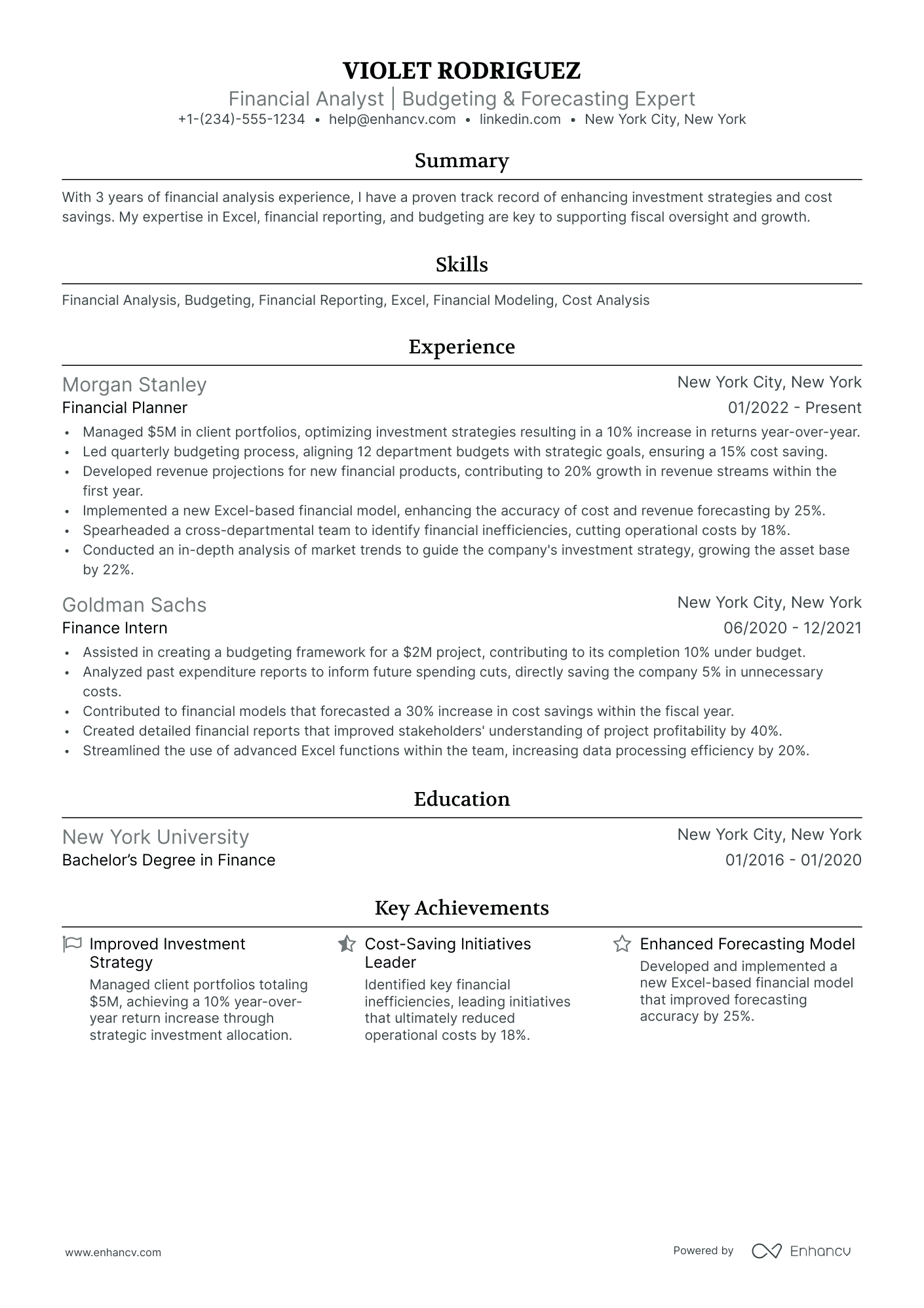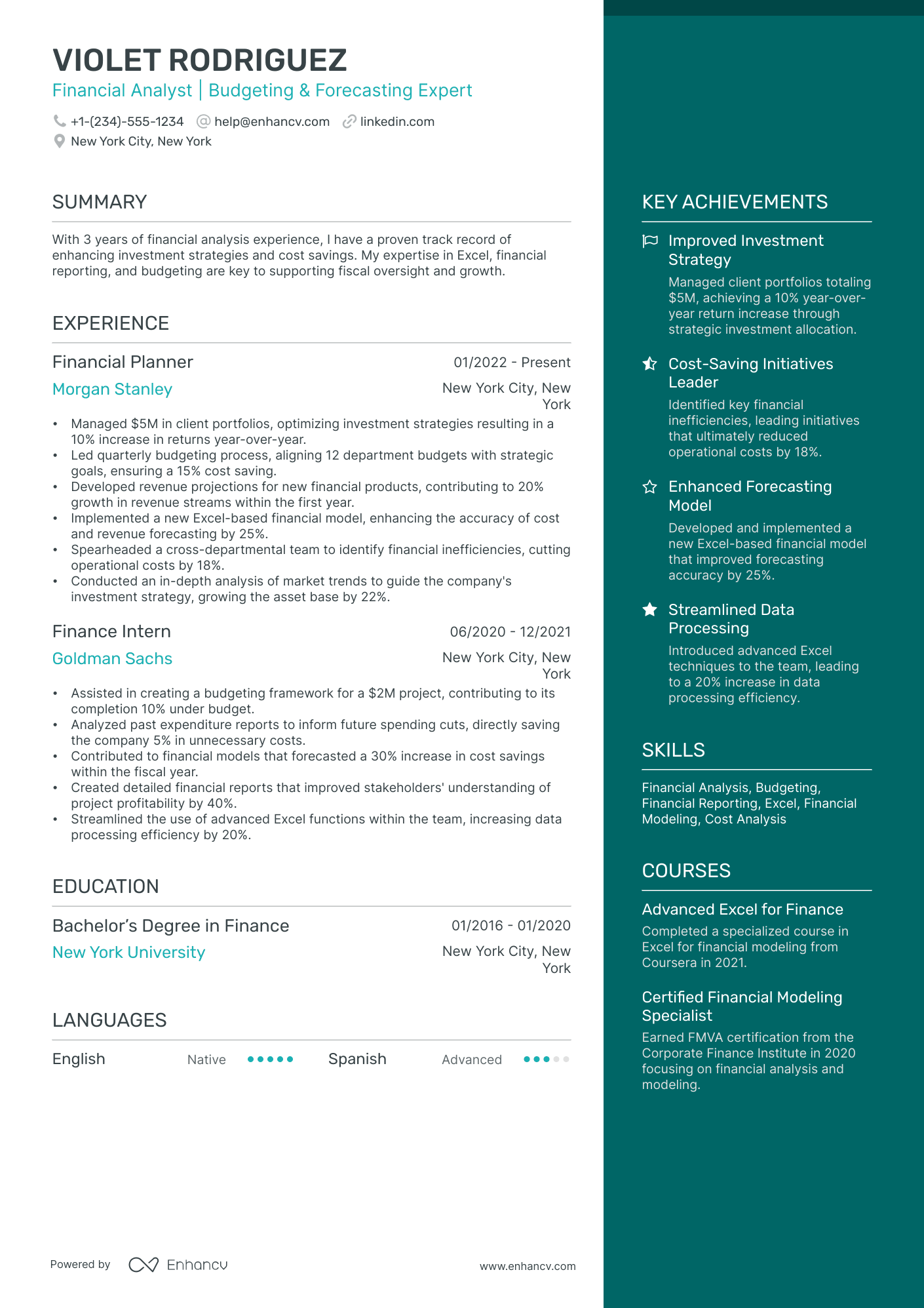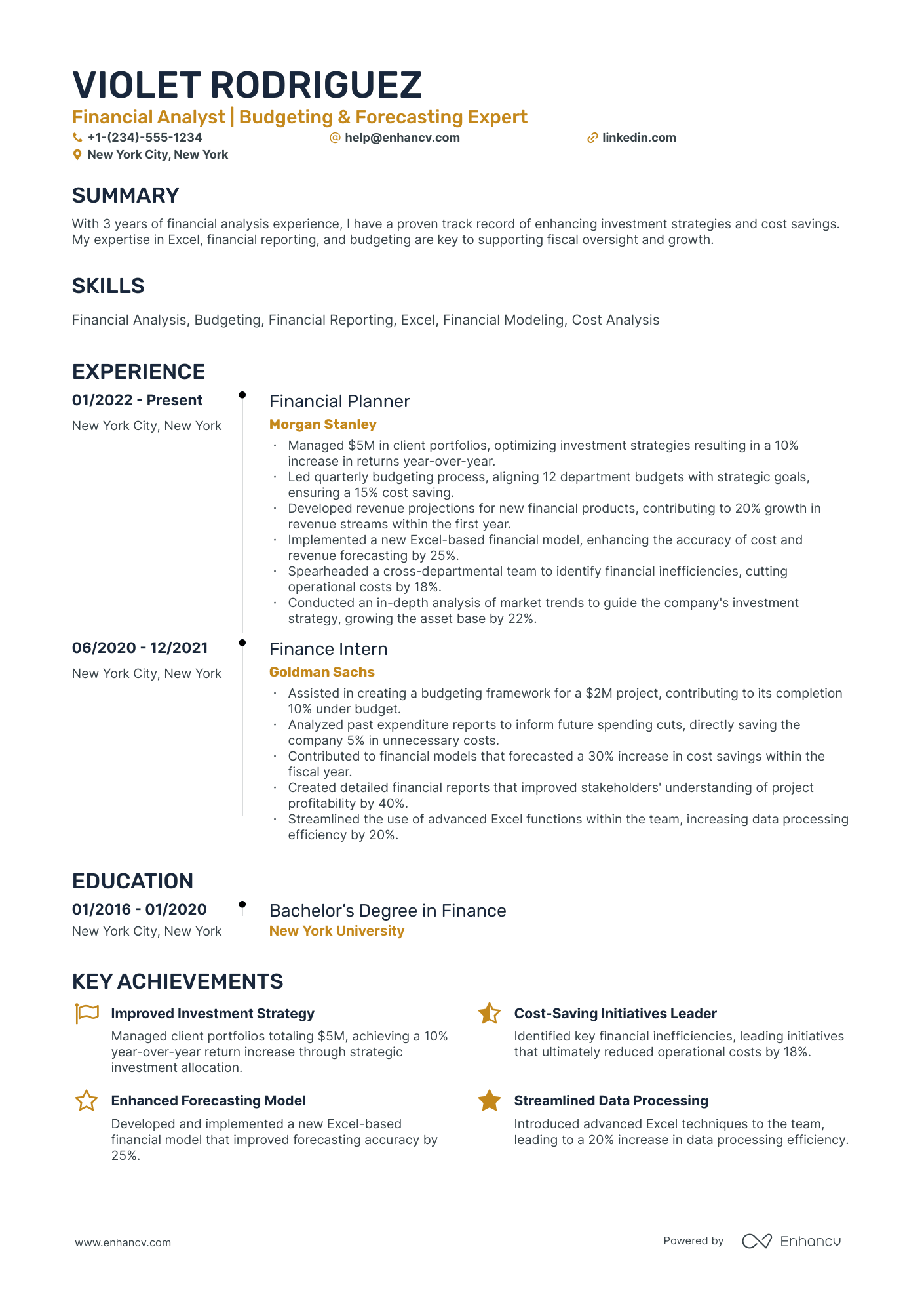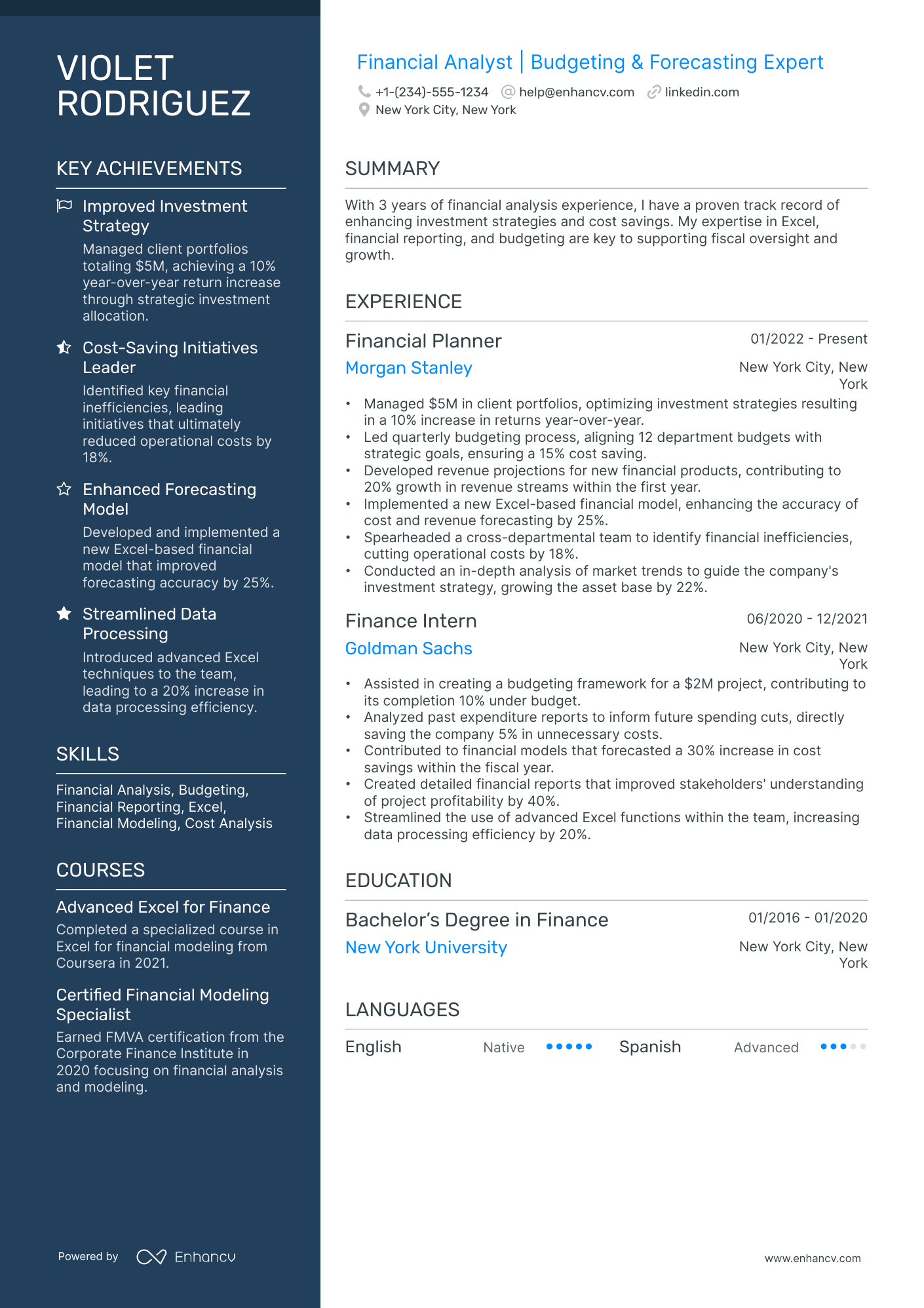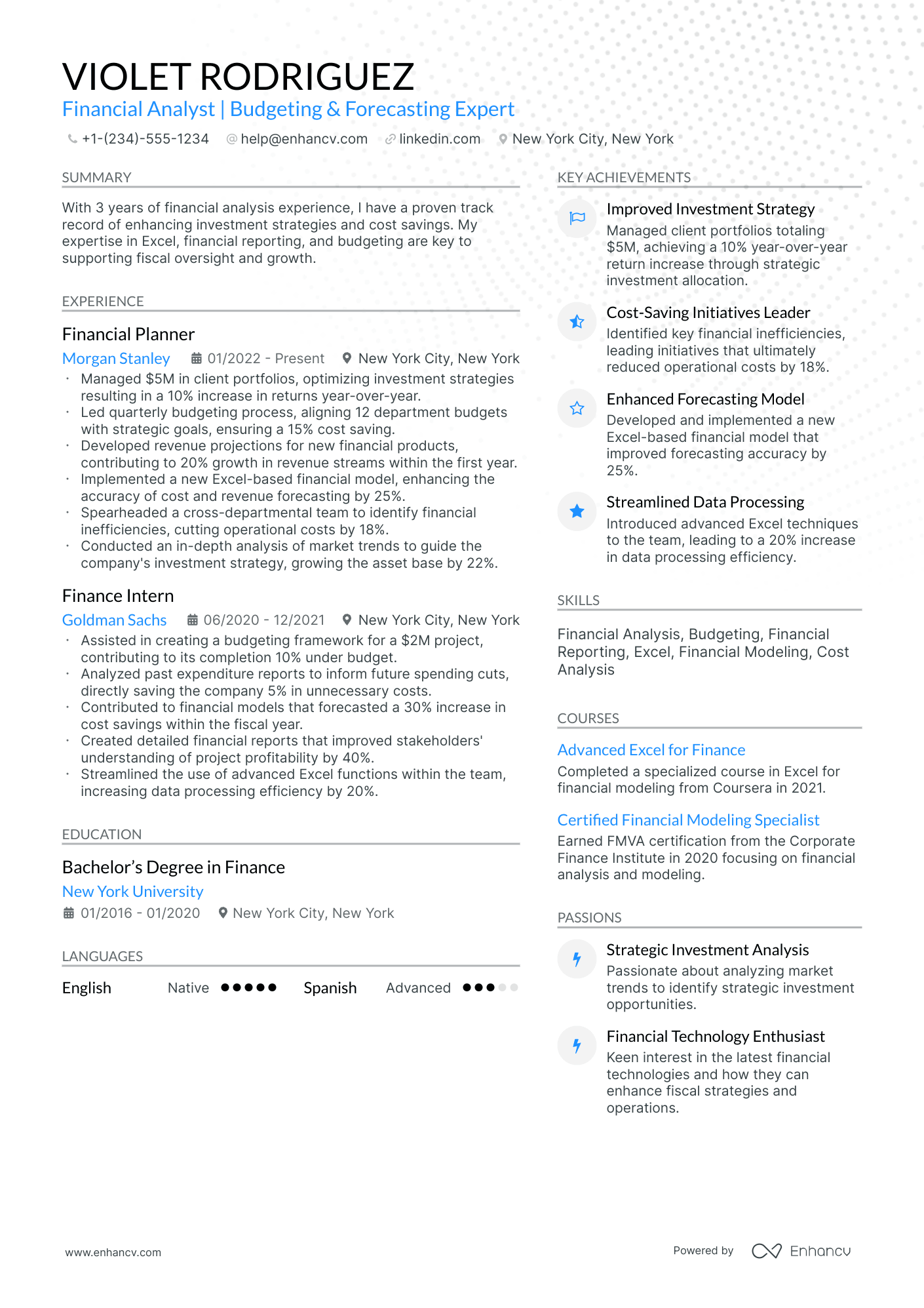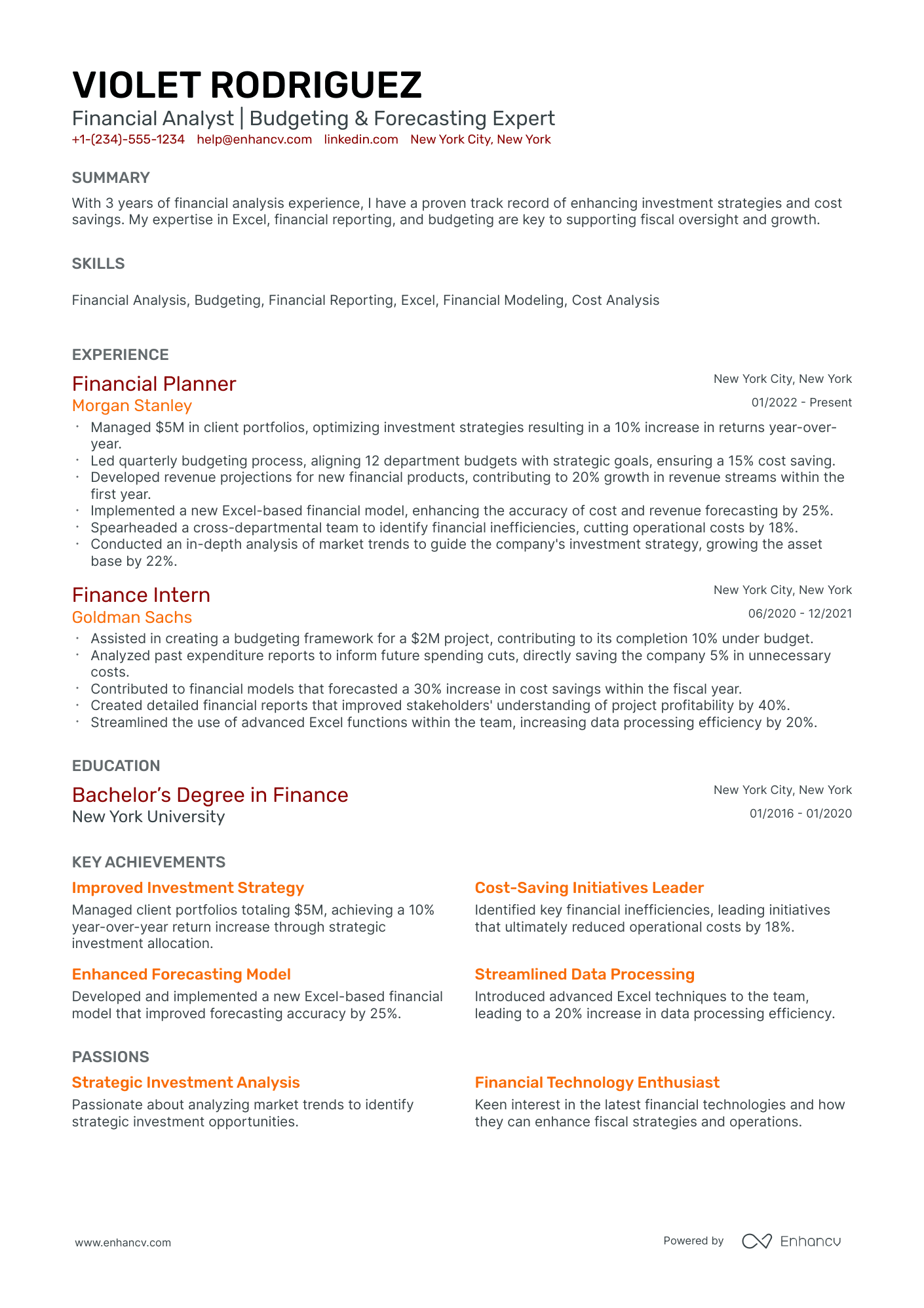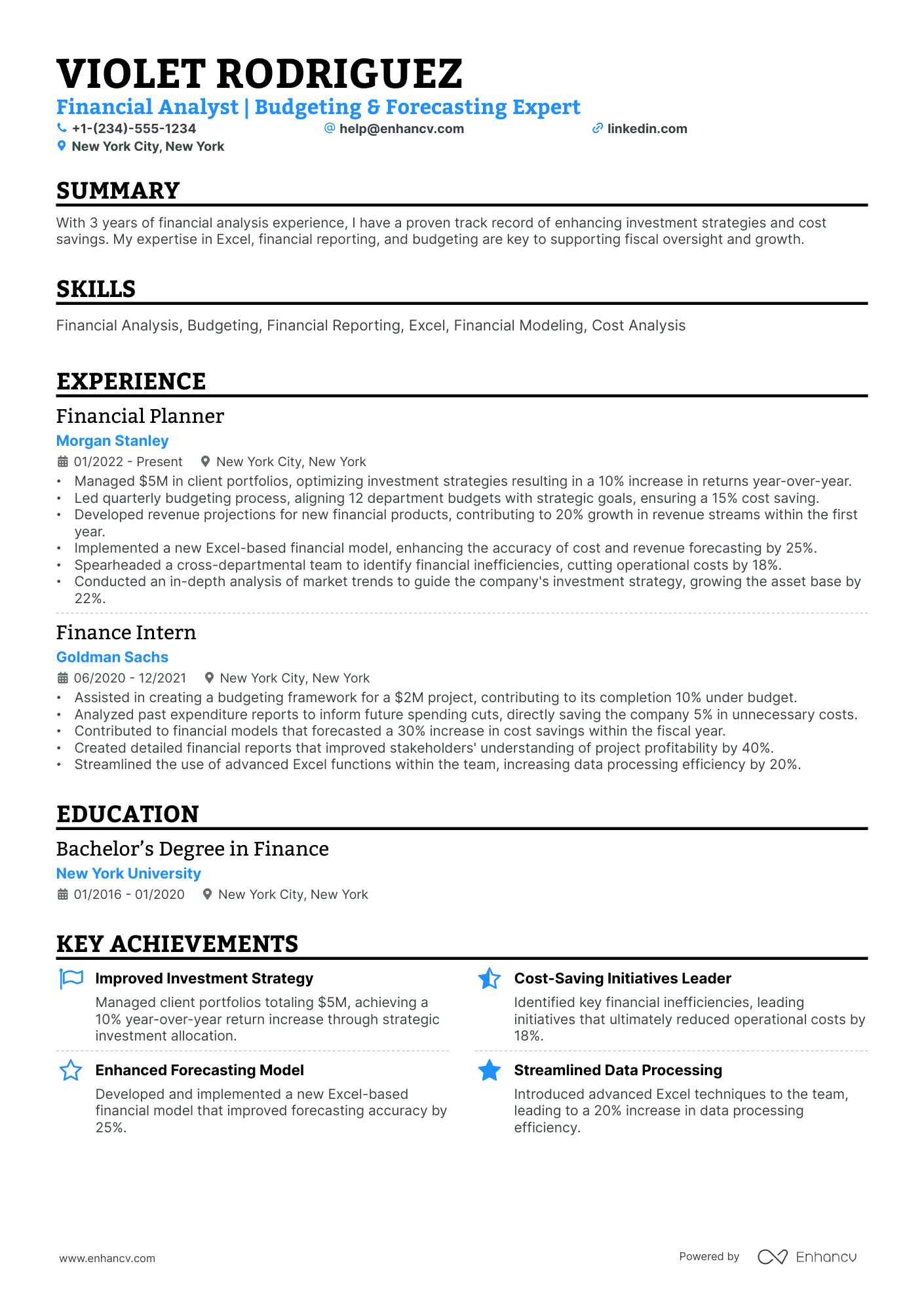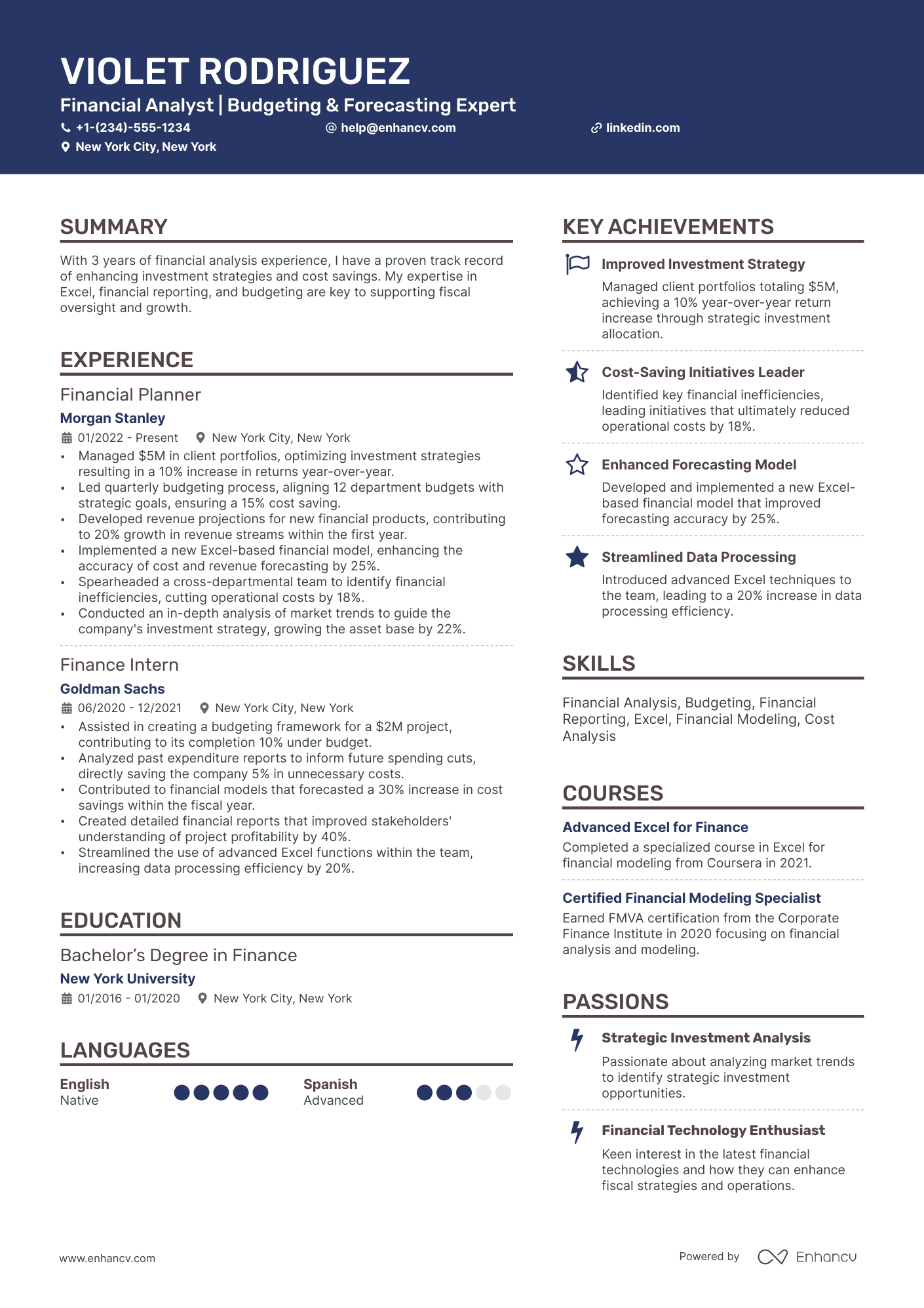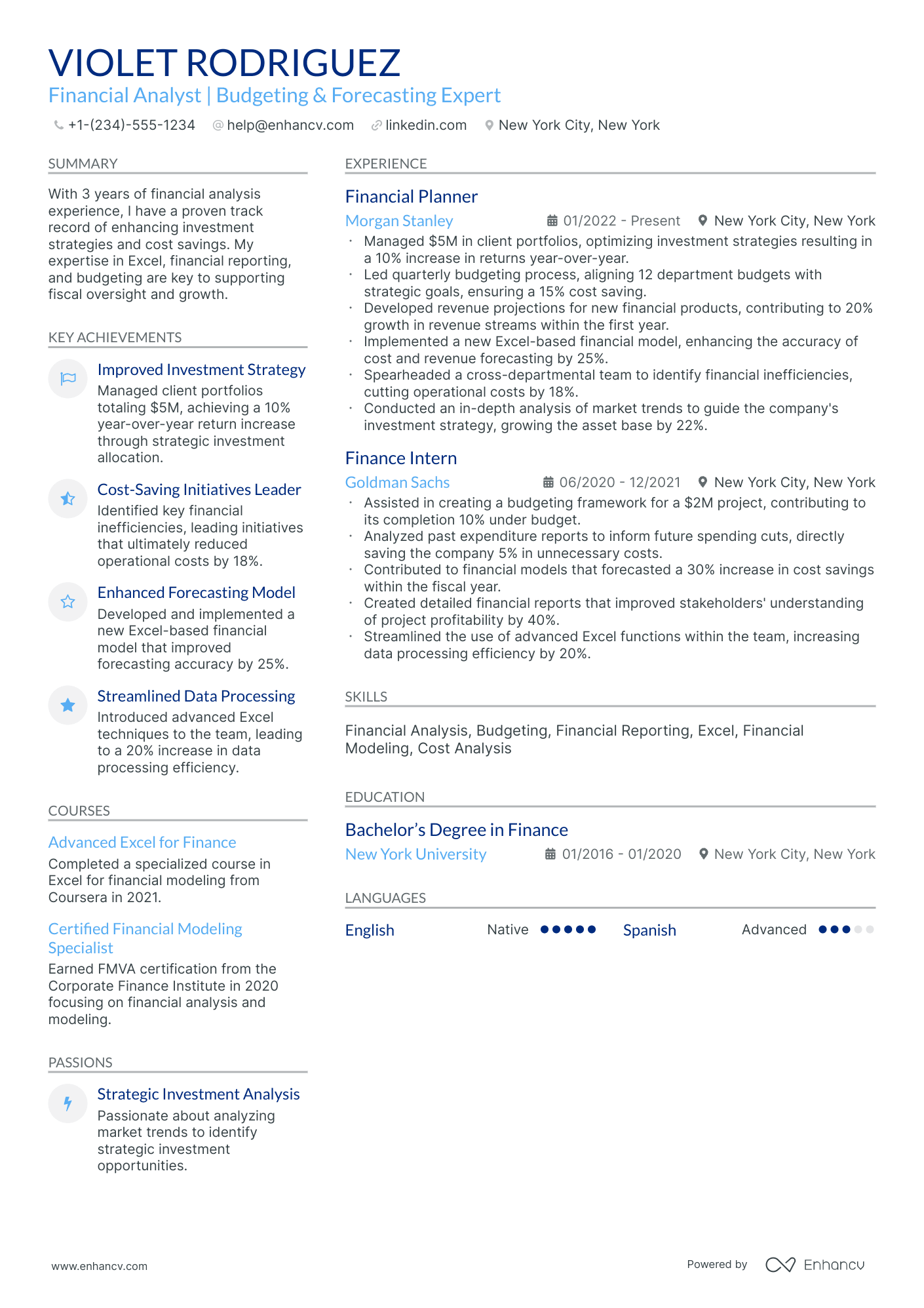One major challenge faced by junior financial analysts is effectively showcasing their quantitative skills and financial modeling abilities on their resume without much professional experience. Our guide can provide strategies for highlighting pertinent coursework, academic projects, and any applicable internships to demonstrate their potential value to employers in a concise and impactful manner.
- Sample industry-leading professional resumes for inspiration and junior financial analyst resume-writing know-how.
- Focus recruiters' attention on what matters most - your unique experience, achievements, and skills.
- Write various resume sections to ensure you meet at least 95% of all job requirements.
- Balance your junior financial analyst technical expertise with personality to stand out amongst candidates.
Looking for related guides for jobs in your field? Check these out:
- Fund Accountant Resume Example
- Finance Business Analyst Resume Example
- Risk Manager Resume Example
- Financial Accounting Resume Example
- IT Auditor Resume Example
- Functional Accounting Resume Example
- Financial Planning Analyst Resume Example
- Actuary Resume Example
- Financial Administrator Resume Example
- Tax Accountant Resume Example
Simple Guide to Your Junior Financial Analyst Resume Format and Layout
Successful junior financial analyst resumes all have one specific characteristic - candidates have invested in a simple resume layout . One that is easy to read, makes a good first impression, and is adapted to their professional experience. There are three distinct resume formats to help you focus on your:
- professional experience - use the reverse-chronological resume format;
- skills and achievements - via the functional skill-based resume format;
- both experience and skills - with a hybrid resume format .
What is more, keep in mind that your resume may be initially assessed by the ATS (Applicant Tracker System) (or the software used by companies in the hiring process). The junior financial analyst resumes that suit the ATS:
- have a header that includes either a role keyword or the job you're applying for;
- should be no longer than two pages;
- be submitted as PDF, unless specified otherwise.
Think about the market’s preferences – a Canadian resume, for instance, could have a different layout.
Upload & Check Your Resume
Drop your resume here or choose a file. PDF & DOCX only. Max 2MB file size.
PRO TIP
You can most certainly use color on your junior financial analyst resume to highlight important information (e.g. headline, job titles, degrees, etc.) or add more personality (e.g. icons and different resume section headings). Just make sure you use up to two colors (primary and secondary), as too many different hues may make your junior financial analyst resume seem too unprofessional or childish.
Essential sections that should make up your junior financial analyst resume include:
- The header - with your contact details (e.g. email and telephone number), link to your portfolio, and headline
- The summary (or objective) - to spotlight the peaks of your professional career, so far
- The experience section - with up to six bullets per role to detail specific outcomes
- The skills list - to provide a healthy mix between your personal and professional talents
- The education and certification - showing your most relevant degrees and certificates to the junior financial analyst role
What recruiters want to see on your resume:
What recruiters want to see on your resume:
- Relevant education, such as a Bachelor's degree in Finance, Accounting, Economics, or a related field.
- Proficiency in financial modeling, data analysis, and spreadsheet skills, typically with strong Excel capabilities.
- Familiarity with financial reporting, budgeting, and forecasting techniques and principles.
- Internship or work experience that involves analysis of financial statements or working with financial data.
- Exposure to financial software and systems such as SAP, Oracle, QuickBooks, or industry-specific tools like Bloomberg Terminal.
What Can Candidates Do About Their Resume, If They Have No Experience
Job requirements can sometimes be answered by other elements you could make more prominent in your junior financial analyst resume.
Thus, you'd be substituting your lack of experience with your relevant:
- Education with details of skills you've obtained that align with the job
- Internships and short-term jobs that are once more dedicated to putting your expertise in the spotlight
- Skills section answering basic and - potentially - more specific job qualifications
- Strengths or accomplishments to show the unique value you present, even as a candidate with less or no professional experience in the industry.
Quantifying impact on your resume
- Highlight financial models you've created or contributed to and specify how they have informed business decisions.
- Document any experience with budget management, including the size of budgets you have managed or reported on.
- Include precision about cost-saving measures you’ve identified, quantifying the annual or project-specific financial impact.
- List any experience with forecasting, including the timescale, scope, and accuracy of your predictions.
- Detail any instances of process improvement you initiated that led to increased efficiency or reduced errors, quantifying the results.
- Showcase your experience with financial reporting, mentioning specific reports you've generated and how they served management or stakeholders.
- Enumerate any revenue-generating projects you have worked on, specifying your role and the financial outcomes.
- Mention instances where you have translated complex financial concepts to non-financial stakeholders, influencing data-driven decision-making.
Action verbs for your junior financial analyst resume
PRO TIP
Integrate various design elements, like icons and charts, if you deem this would enhance the readability of your resume and also help it stand out.
Balancing Hard and Soft Skills in Your Junior Financial Analyst Resume
Recruiters indeed pay close attention to the specific hard and soft skills candidates possess. Hard skills refer to technical abilities or your proficiency in technologies, while soft skills are the personal attributes and qualities developed over your lifetime.
If you're unsure about effectively quantifying these skills on your resume, follow our step-by-step guide. It's crucial to first understand the key job requirements for the role. Doing so enables you to accurately list your:
- Hard skills in sections like skills, education, and certifications. Your technical expertise is straightforward to quantify. Most organizations find it sufficient to mention the certificates you've earned, along with your proficiency level.
- Soft skills within your experience, achievements, strengths, etc. Defining interpersonal communication traits in your resume can be challenging. Focus on showcasing the accomplishments you've achieved through these skills.
Remember, when tailoring your junior financial analyst resume for the Applicant Tracking System (ATS), ensure that the skills you list match exactly with those in the job requirements. For instance, if the job listing specifies "Microsoft Word," include this exact term rather than just "Word" or "MSO."
Top skills for your junior financial analyst resume:
Microsoft Excel
Financial Modeling
Data Analysis
SQL
Power BI
Tableau
QuickBooks
SAP
Financial Reporting
Forecasting
Analytical Thinking
Attention to Detail
Communication
Problem-Solving
Time Management
Teamwork
Adaptability
Critical Thinking
Organization
Interpersonal Skills
The top 5 certifications for your junior financial analyst resume:
- Chartered Financial Analyst (CFA) - CFA Institute
- Certified Public Accountant (CPA) - American Institute of Certified Public Accountants (AICPA)
- Financial Risk Manager (FRM) - Global Association of Risk Professionals (GARP)
- Chartered Alternative Investment Analyst (CAIA) - CAIA Association
- Certified Financial Planner (CFP) - Certified Financial Planner Board of Standards, Inc.
PRO TIP
Integrate various design elements, like icons and charts, if you deem this would enhance the readability of your resume and also help it stand out.
Including Your Education and Certification on Your Junior Financial Analyst Resume
The significance of your resume education section is paramount. It can show your diverse talents and experiences that are relevnt to the position.
- Incorporate educational qualifications, mentioning the institution and period.
- If you're on your academic journey, pinpoint your expected completion date.
- Opt for leaving out degrees that don't serve the job's purpose.
- Provide an overview of your educational experiences if it spotlights your milestones.
When recruiting for junior financial analyst roles, candidates with relevant education and certification definitely stand out amongst competitors.
Showcase your academic background in the best way possible by:
- Listing all degrees and certifications that are part of the candidate qualifications in the junior financial analyst advert
- Including any extra certificates, if they make sense to your application
- Not going over the top in details - the certificate name, institution, and dates are enough
- If you're in the process of obtaining a degree or certificate that's relevant to the job, include your expected graduation/ certification dates
- The education and certification sections help back up your application with years of experience in the industry or niche.
Select some of the most cutting-edge or applicable credentials for your next junior financial analyst application from our list:
PRO TIP
If you don't happen to have that much relevant experience for the role, you could select a different format for your resume. Popular choices include:
- functional skill-based resume format - that puts the main focus on your skills and accomplishments;
- hybrid resume format - to get the best of both worlds with your junior financial analyst experience and skills.
Recommended reads:
PRO TIP
You can most certainly use color on your junior financial analyst resume to highlight important information (e.g. headline, job titles, degrees, etc.) or add more personality (e.g. icons and different resume section headings). Just make sure you use up to two colors (primary and secondary), as too many different hues may make your junior financial analyst resume seem too unprofessional or childish.
Recommended reads:
Which One to Use: a Resume Summary Or a Resume Objective?
The junior financial analyst resume summary or objective serves as a good introduction to your experience for recruiters.
Have you ever wondered which one (the summary or objective) will be more appropriate for your junior financial analyst resume?
- If you are a less experienced professional, write a resume objective statement. The objective is about three sentences long and provides recruiters with information about your career goals, strengths, and achievements . It should basically denote how you see yourself in this particular role, and what is your relevant experience and/or know-how;
- If you happen to have plenty of relevant experience, select your most impressive achievements for your resume summary. The summary is no longer than five sentences and serves as a storytelling instrument - highlighting your greatest career wins . Don't forget to align your summary with the job requirements to ensure your resume stays relevant to the role, while passing the Applicant Tracker System assessments.
Read on for more information and examples of resume summaries and objectives from real world professionals.
Resume summaries for a junior financial analyst job
- To leverage a deep understanding of financial modeling and data analysis techniques to aid ABC Finance Corp in its endeavors to optimize investment strategies and enhance portfolio performance while further developing my professional skills in a dynamic market environment.
- Aspiring to bring my strong quantitative analysis abilities along with advanced proficiency in Excel and SQL to XYZ Financial Group, enabling them to distill complex financial data into actionable insight, and to grow my expertise in asset management and risk assessment.
- Seeking an opportunity with Capital Growth Inc., where I can apply my robust knowledge of market research and corporate finance principles to support data-driven decision-making processes and contribute to sustained financial growth and client satisfaction.
- Eager to contribute to Peak Investments’ legacy of surpassing client expectations by utilizing my adept skills in financial forecasting and keen eye for emerging market trends, while committing to a pathway of continuous learning and professional development.
- Aiming to join the Global Finance team to enhance financial strategies through diligent research, sophisticated economic analysis, and a profound grasp of investment banking operations, fostering both corporate and personal advancement in a fast-paced sector.
- Determined to support the success of Prosperity Financial Services through meticulous financial reporting, valuable insights derived from data interpretation, and a strong foundation in statistical analysis, all while embracing a mindset of innovation and strategic thinking.
What Else Can You Add to Your Junior Financial Analyst Resume
What most candidates don't realize is that their junior financial analyst resumes should be tailored both for the job and their own skillset and personality.
To achieve this balance between professional and personal traits, you can add various other sections across your resume.
Your potential employers may be impressed by your:
- Awards - spotlight any industry-specific achievements and recognitions that have paved your path to success;
- Languages - dedicate some space on your junior financial analyst resume to list your multilingual capabilities, alongside your proficiency level;
- Publications - with links and descriptions to both professional and academic ones, relevant to the role;
- Your prioritization framework - include a "My Time" pie chart, that shows how you spend your at-work and free time, would serve to further backup your organization skill set.
Key Takeaways
- Ensure your junior financial analyst resume uses a simple, easy-to-read format that reflects upon your experience and aligns with the role;
- Be specific within the top one-third of your resume (header and summary or objective) to pinpoint what makes you the ideal candidate for the junior financial analyst role;
- Curate information that is tailored to the job by detailing skills, achievements, and actual outcomes of your efforts;
- List your certifications and technical capabilities to demonstrate your aptitude with specific software and technologies;
- The sections you decide on including on your [job resume] should pinpoint your professional expertise and personality.
